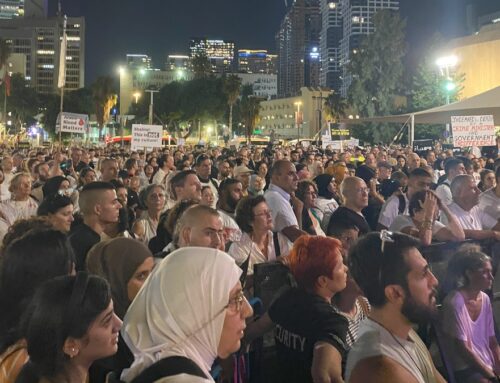Recently Haredi-Zionist rabbis have been pressing the IDF to separate female and male soldiers serving in the same units. They argue that the current Joint Service order, which regulates the inclusion of women in gender-mixed units, hampers the modesty requirements of religious soldiers. In response, a coalition of Israeli organizations fighting for women’s rights and religious pluralism appealed to the IDF chief of Staff saying that “Segregation based on gender is a violation the principle of equality and is against the Basic Law: Human Dignity and Liberty.”
Michal Gera Margaliot is the managing director of Israel Women’s Network and a fellow at the Alliance for Israel’s Future. She published this text in Saloona on July 27, 2017.
The changes expected in the Joint Service Order will segregate female soldiers and push them aside.
The IDF is considering changes to the Joint Service Order, because of Haredi-Zionist rabbinical pressure. The pressuring rabbis are the same rabbis who argue that women shouldn’t serve in the IDF at all and that female soldiers hamper the IDF’s ability to win.
Three comments on the expected changes to the Joint Service Order:
First, the new order states that the IDF should plan events which “make all the soldiers feel comfortable from the outset.” But we already know that the demand to be considerate is always one-sided: we must consider the feelings of religious soldiers, they don’t need to consider ours. The number of females on stage in IDF events has already shrunk, and sometimes female soldiers are even forbidden to sing in public. Making “all soldiers feel comfortable from the outset” means that from now on women in the IDF will neither perform on stage nor appear in official ceremonies.
Second, [the new order determines that] an IDF officer will be permitted to refuse commanding females in joint units. This means that without official declarations, fewer jobs and assignments will be opened to women, because opening positions to women would invite religious officers and soldiers to refuse and make special requests. The new order gives the impression that the IDF cares more about the new sensibilities of religious soldiers than the actual contribution of female soldiers.
Third, [by surrendering to rabbinical demands] the IDF gives credence to the hallucinatory theories of the extremist rabbis, according to which female soldiers hamper the IDF’s ability to win. The new order create new segregated service units and from now on when a soldier says he is uncomfortable serving with a woman – the IDF will move her aside.
But, women make up about a third of all IDF soldiers, and their number in combat and combat support positions has risen in recent years. The extreme leadership of the national-religious public is the one distracting the IDF and hampering its ability to win.
___
The truth is that the IDF cannot exist without the women’s service. But the struggle against pushing the women out of the army should not be a women’s fight alone. The IDF is leading a change that is expected to create gender segregated units. But there is another option. Secular soldiers and officers, choose to serve with your sisters, the women. If religious soldiers don’t want to serve with women, let them serve not only in gender homogenous units, but also in religious units. If religious soldiers want to serve without women, they can also serve without secular men.
The rabbis demand to annul the Joint Service Order. We agree: there is no need for an order regulating gender inclusion in the IDF. We live together all our lives and we will serve togetherץ Religious soldiers are welcomed to take part in the people’s army, which includes women. Religious soldiers who don’t want to serve in accordance with the values of the IDF and the State of Israel will have to find segregated units that will push them aside, rather than push female soldiers to a corner.







Leave A Comment